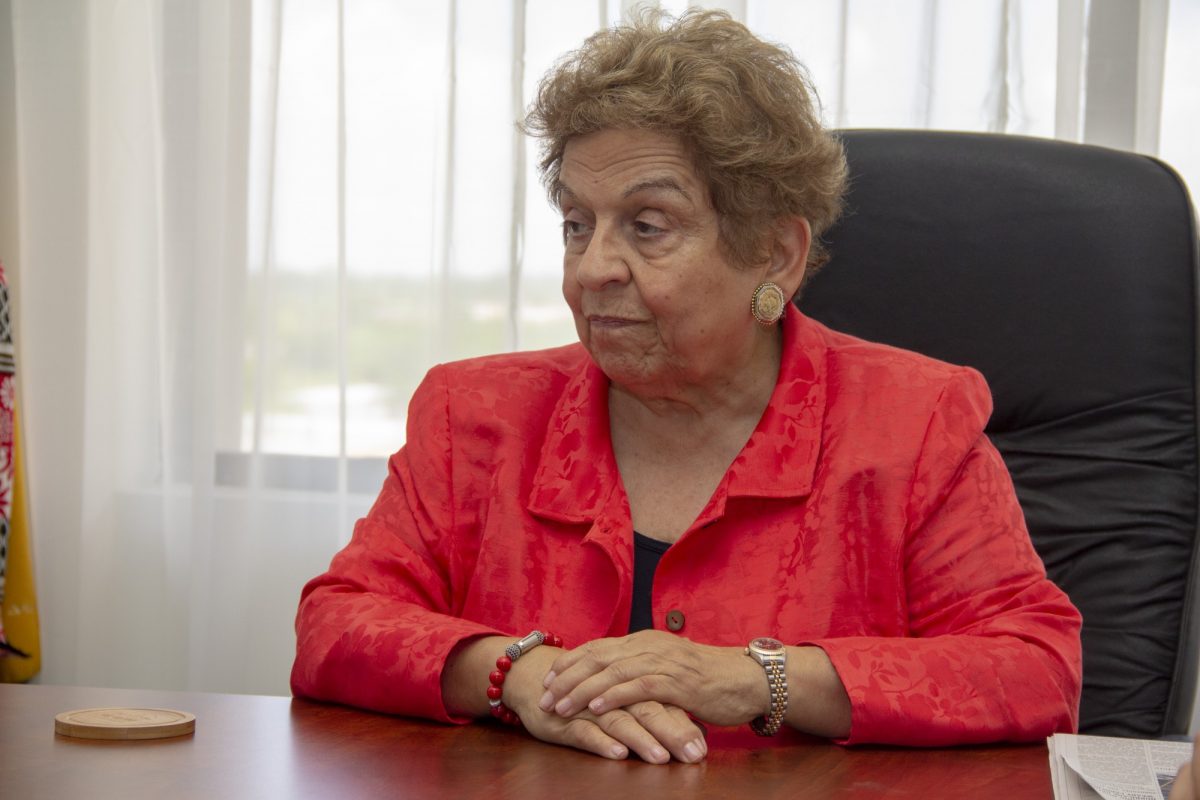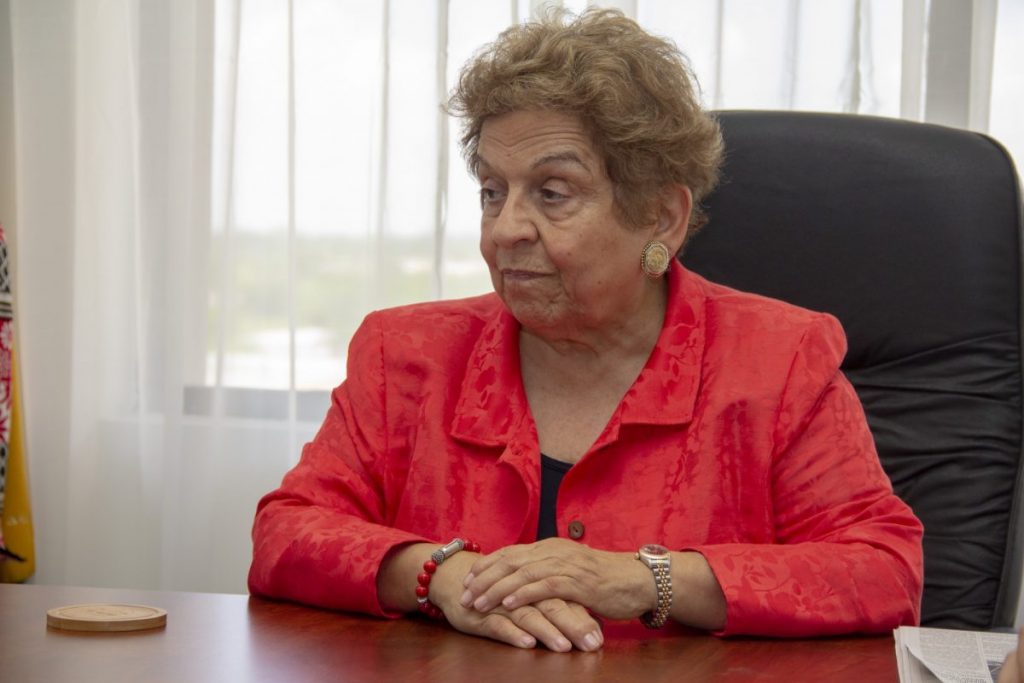
Congresswoman Donna Shalala, a public health expert herself, has been outspoken during the coronavirus pandemic, calling for better leadership from President Donald Trump, as well as Florida Gov. Ron DeSantis.
As the former Secretary of Health and Human Services under President Bill Clinton, Shalala is continuing to fight for the protection of her constituents in Florida’s 27th district by keeping them informed and advocating for them in congress.

She recently worked on a historic $2 trillion stimulus bill, called the Coronavirus Aid, Relief and Economic Security, or “CARES” act, which was passed by the House of Representatives and the Senate and put into law on March 27.
The Miami Hurricane sat down with Shalala, former president of the University of Miami, to ask questions about coronavirus politics and how COVID-19 will affect college students.
Here are her answers.
What aspects of the CARES act are you most proud of?
“I’m proud of the fact that we focused on workers first, on people that will be unemployed and on people that are getting sick from the coronavirus, and that it’s been bipartisan,” Shalala said.
In putting together this package, Shalala specifically advocated for higher education.
The CARES act includes provisions for grants to universities and colleges around the country to help them survive drops in income due to room and board refunds, and it will also delay loan payments, she said.
Shalala also called for free testing and helping hospitals and businesses, all of which is included in the act.
“We’ve expanded unemployment insurance to everybody who’s laid off or furloughed or is in the gig economy or is a contractor to make sure that everybody continues to get some salary so they can pay their rent,” Shalala said. Beyond workers, the act will also help keep businesses afloat by providing them grants to cover payroll, rent and utilities.
Another key part of the act, she said, are the $1,200 payments for anyone who filed taxes in 2018 or 2019 and earned less than $75,000
Where does the CARES Act fall short?
“We fall short on covering people who don’t have healthcare because they get sick, which means that the hospitals will have to absorb the cost. So we need to go back in and revise healthcare coverage for those who don’t have it,” Shalala said, adding that this is something the House is currently working on.
A lot of what seems to be in this stimulus package doesn’t coincide with typical Republican rhetoric. Why is that?
“We have no choice. The disease doesn’t know what political party it belongs to,” she said.
Why were college students left out of the payments in the CARES act?
While college students listed as dependents are ineligible, Shalala said working college students will be able to receive payments.
“Most of the college students in the United States are working and going to school and are not dependent. Most of the students at the University of Miami are listed as dependents,” she said. But for those listed as dependents, their families may still receive money if their parent makes under $75,000 or if both of their parents combined earn less than $150,000 per year, Shalala explained.
How will this impact students who are graduating now and entering the job market during a possible economic crisis?
“It’s a pretty scary time. The economy will be much tighter for a while, but it will come back and workers will be needed, particularly college graduates. Those that have entered professions like nursing, anything in the health care area or technology, there will be lots of opportunities. And there still will be opportunities for entrepreneurs,” Shalala said. “But the market’s going to be very open for a long time, for a few months until we get some kind of treatments, or a year until we get a vaccine.”
Are politicians dropping the politics and fighting coronavirus?
“It’s happening in the House and in the Senate, but it’s not happening in the White House. The president does not seem to be consistently supporting science. He has not been a strong leader. But the Senate and the House have been very bipartisan, and it has demonstrated that when we’re in a crisis, we stand together,” Shalala said. The CARES act passed in the House via a voice vote and in the Senate with a 60 vote majority and was then signed into law by President Donald Trump on March 27.
At the beginning of March, Shalala wrote an op-ed for the New York Times calling for the country to unite around the leadership of public health experts, not politics.
Up until the past few weeks, the president hadn’t really made any national statements in support of addressing the coronavirus. When did the House really start to take this seriously?
“We passed our first bill in early February and it was all bipartisan. This CARES act is our third bill and we’re already working on our fourth bill,” Shalala said, stating that this bill will focus on getting good health care coverage for everyone that gets sick.
What sorts of things have you heard from the president that have been unhelpful during this pandemic?
“He hasn’t been consistent in rallying the people. He’s left it to the governors. He’s refused to tell the whole country to stay at home and he’s been touting fake science,” Shalala said. “He has not been consistent about supporting science or public health experts. And it’s scary. This administration has been slow to get off the ground. The governors have been stronger.”
How would you characterize Florida Gov. Ron DeSantis’ leadership during this pandemic?
“Uneven. The governor has been weak and until recently was unwilling to tell everybody to stay at home,” Shalala said. DeSantis became the 34th governor to issue a stay-at-home order on April 1, despite Florida having the seventh highest number of cases in the country. There are multiple loopholes in this stay-at-home order, Shalala said, such as for religious organizations and gun stores.
“The governor has left loopholes and has been weak in advocating for the hospitals and for supplies. He just is not decisive and we need him to be more decisive,” she said, noting that this is in part because of the president’s actions. “The president has been all over the place, and the governor has been following the president’s lead, which is unfortunate.”
What have you learned from your experience as the Secretary of Health and Human Services under President Bill Clinton that is helping you lead now in the House?
“I think leading my community is just as important, putting out clear information in my district as well as my knowledge of the department and what we need to do in terms of rebuilding public health at the local and state level,” Shalala said. On her website, Shalala provides comprehensive information about the coronavirus, from symptoms to watch out for to specifics on how to apply for small business loans. She said that she is also hosting tele-town halls and is keeping connected with her constituents through social media.
What do you think will be the long term political impacts of this pandemic?
“I think that we’ll never be the same again because we’ll be looking over our shoulders at the next pandemic,” Shalala said. “We can be prepared for the next one if we get our act together.”
How might this affect the election in November?
“I think that the administration is going to be judged by how they handle the pandemic, and so far they’re failing. But it’s a long way till November.”
What will be different when we emerge?
“I think this is going to change higher education because we’re going to learn a lot about technology and learning. We’ve been slow to adopt modern technology to higher education and this is going to increase our ability to do it,” said Shalala, who has been an academic her entire life and most recently served as the fifth president of UM, a role she held from 2001 until 2015.






